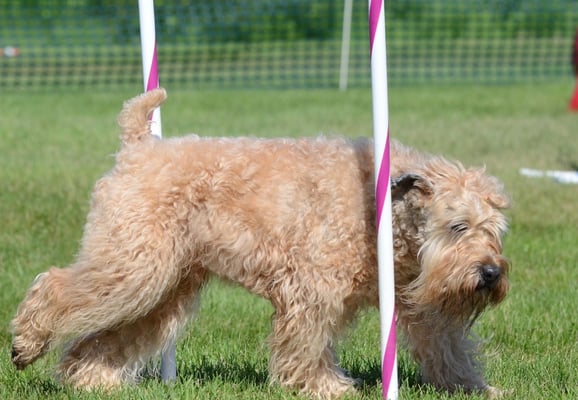Donate to the SCWTCA Endowment, Inc here: https://www.scwtcaendowment.org/donate

Soft Coated Wheaten Terrier Blog
An Integrative Approach to Anxiety in Dogs:
Dr. Matthew Muir is an Integrative Veterinarian. He gave a presentation at the January 2025 Pet Summit on Anxiety. The title of his presentation was “An Integrative Approach to Anxiety.”
I listened to his talk, and here are my notes. I’m sure I’ve missed some things, but there are some good takeaways regardless.
Dr. Matt believes an integrative approach is more helpful and comprehensive when working with anxiety in our dogs. He said it provides a safety net that conventional approaches may not offer, and it can protect the body and brain because the hyperarousal of anxiety and stress has a damaging effect on the brain through things like oxidative stress. Long-term anxiety or stress can lead to issues like autoimmune disorders or cancer. The short-term impact of anxiety is reduced quality of life.
The vagus nerve connects the brain to various organs and is the predominant means of communication within the body. We want to increase vagus nerve activity, as this can reduce stress and help the microbiome. Diet, botanicals, herbs, touch, massage, acupuncture, microbiome gut bacteria, and nutraceuticals (like probiotics) can all increase activity of the vagus nerve.
Diet can have a calming effect, reduce inflammation in the body, improve brain function, and improve digestion. Amino acid nutrition is gaining traction. High-protein diets can reduce serotonin in the body. This can potentially impact mood and increase anxiety levels. High-quality, easily digested proteins are best. Diets higher in omega-3 fats are beneficial. Diet has been linked to aggression and certain behaviors in dogs.
Tryptophan is the precursor to serotonin (chicken is high in tryptophan). Dr. Matt recommends orange vegetables (sweet potatoes, carrots, pumpkin). Make sure it’s a complete diet and isn’t missing any nutrients. Selenium (fish, eggs) and vitamin E (broccoli, salmon, fish oils) are helpful to reduce oxidative stress.
Avoid high-glycemic-index foods like refined grains and GMO grains like soy and corn. Refined grains can damage the microbiome. Glyphosates present in some of these foods upset the microbiome and increase the permeability of the gut (which can cause leaky gut).
Fresh, good-quality foods are recommended. Complex carbohydrates are good. Diets higher in omega-3s and low in inflammation were encouraged.
Adaptogens are a class of herbs that have the ability to increase the body’s resilience to physical, chemical, and psychological stressors. They influence cortisol by lowering it. They don’t deplete oxygen in the body, and they can reduce stress. Dr. Matt’s favorite herb is ashwagandha. He also recommends panax ginseng, astragalus, withania, medicinal mushrooms, valerian, and lemon balm. Look for organic, high-quality products from a reputable company (one that preferably conducts and posts third-party testing). Mushrooms are very safe.
Work with an animal health professional and talk to your vet, especially if your dog is on psychotropic medications. Dr. Matt says, “Herbal medicines can give you better outcomes for sure.” His recommendation: Don’t rely on medicines alone. Understand your dog and work to support them with behavior modification. “Learn to talk to your dog.” The body and the brain are very connected. And make sure you practice self-care so you have the energy to support your dog.
Dr. Matt has created a pet food because he feels nutrition is a big concern. It’s available in the US and Australia. Dr Matt’s website: All Natural Vet Care.
Conclusion
Anxiety in Soft Coated Wheaten Terriers is manageable with the right approach. Whether your Wheaten suffers from separation anxiety, noise phobias, or generalized nervousness, a combination of training, environmental adjustments, natural remedies, and veterinary intervention can help them lead a happier, calmer life. By understanding their triggers and providing consistent support, you’ll strengthen your bond with your Wheaten Terrier and help them feel safe and secure.
Has your Wheaten Terrier experienced anxiety? Share your tips via email deb@wheatenterrier.live and I will add them to our list.
Additional Resources
Find certified professionals at:
· International Association of Animal Behavior Consultants (IAABC)
· Certification Council for Professional Dog Trainers (CCPDT
For Links on Anxiety:
Dog Anxiety For Dummies Cheat Sheet: Quick Tips










Understanding Anxiety in Soft Coated Wheaten Terriers: Causes, Types, Treatments, and Resources
Other things to consider before delving into anxiety reduction training include doing a self-assessment. Emotional contagion is when our dogs pick up on our stress and anxiety. Consider where you are at emotionally and how this could impact your dog. Also keep in mind, sometimes we move to punish them for negative behaviors, but this can actually increase their fear, which will result in the behaviors worsening.
This blog explores some different types of anxiety in Wheaten Terriers, causes, symptoms, and effective treatments. Experts, and equipment that can help manage and alleviate anxiety in our dogs are also recommended.
Types of Anxiety in Soft Coated Wheaten Terriers
1. Separation Anxiety
One of the things that Cesar Milan said, that really hit home for me, is that being alone is one of the most difficult things our dogs need to learn how to do. Dogs are pack animals and being on their own is unnatural. So being alone is a really tough lesson for our pups to learn and adapt to. If we can work from that perspective it might help how we understand and approach things.
Separation anxiety is one of the most common forms of anxiety in Wheaten Terriers. Our dogs form strong attachments to us, don’t relish being left alone and may become extremely distressed when we leave them.
Symptoms:
Excessive barking, howling, crying and whining
Destructive chewing or scratching at exit points like doors/windows
House soiling (even once house-trained)
Pacing, restlessness, yawning, licking, stretching
Drooling or panting excessively
Chewing on themselves
Trembling or shaking
Possible Causes:
Lack of early independence training
Sudden changes in routine
Traumatic events, past trauma (e.g., rehoming, long periods alone)
Genetic predisposition
2. Noise Anxiety (Phobias)
Many Wheaten Terriers are sensitive to sounds of different varieties as well as loud noises, such as thunderstorms, fireworks, or construction sounds.
Symptoms:
Trembling or shaking
Hiding or trying to escape
Excessive drooling
Refusing to eat
Introduction
Like many dog breeds, our Wheatens can be prone to anxiety, which can significantly impact their quality of life and the bond they share with us. Being a bit of a Velcro dog they lean towards separation anxiety naturally. Anxiety can manifest itself in various ways, from mild nervousness to severe panic disorders.
Some health issues can cause anxiety-like symptoms. A vet check is crucial to rule out:
· Pain (arthritis, dental issues)
· Neurological disorders
· Hypothyroidism
· Vision/hearing loss (can increase startle responses)
Common Triggers:
Thunderstorms
Fireworks
Alarms
Phones
Vacuum cleaners
Sirens
3. Social Anxiety (Fear of People or Other Dogs)
Some Wheatens may exhibit nervousness around strangers, unfamiliar dogs, or crowded environments.
Symptoms:
Cowering or tail tucking
Growling or snapping (if feeling threatened)
Avoidance behaviors (hiding behind owner)
Causes:
Lack of early socialization
Negative past experiences
Genetic predisposition to nervousness
4. Generalized Anxiety Disorder (GAD)
Some Wheaten Terriers may suffer from chronic, low-level anxiety without a specific trigger.
Symptoms:
Constant pacing
Excessive licking (especially paws)
Difficulty settling down
Hypervigilance (always "on edge")
Causes:
Genetic factors
Chronic stress
Underlying medical conditions
5. Travel or Car Anxiety
Some Wheatens become anxious during car rides, making vet visits or family trips stressful.
Symptoms:
Panting, drooling, or vomiting in the car
Whining or trembling
Refusing to enter the vehicle
Causes:
Motion sickness
Negative associations (e.g., only going to the vet)
Effective Treatments for Anxiety in Wheaten Terriers
1. Behavioral Training & Desensitization
Counterconditioning: Pairing a feared stimulus (e.g., thunder) with positive rewards (treats, play, cuddles, and other positive distractions).
Gradual Desensitization: Very slowly exposing your dog, while providing positive emotional support, to triggers at a low intensity and increasing exposure over time.
Independence Training: Teaching your Wheaten to be comfortable alone by starting with short absences and gradually increasing duration.
2. Environmental Management
Safe Spaces: Create a quiet, cozy den (crate or covered bed) where your dog can retreat.
White Noise Machines: Help mask frightening sounds like thunderstorms.
Calming Music: Specially designed playlists like Pet Calming Maestro can reduce stress or try the iCalm Dog Bluetooth Speaker and Classical Dog Calming Music.
Activities: Puzzle toys and lick mats, such as the Hyper Pet Licking Mat for Dogs, snuffle mats, safe chew toys (don’t leave them alone with these if they are likely to eat them).
Audio video cameras: Allow you to see and reassure your dog remotely.
3. Natural & Over the Counter Remedies
Flower and Energy Essences: These are liquid extracts made from the energetic imprint of flowers and other natural materials. They work on a vibrational level, influencing your dog’s emotional and physical energetic balance. Dr Jean Hofve is an expert on these for both cats and dogs. Dr. Jean’s website.
CBD Oil: Studies suggest CBD can reduce anxiety in dogs (read my blog on Cannabis and consult your vet before trying it).
Calming Supplements:
L-theanine, melatonin, or chamomile-based products.
Purina Pro Plan Veterinary Supplements Calming Care Powdered Dog Calming Probiotic
Hemp Calming Chews or Oil for Dogs
Zylkene- alpha-S1 tryptic casein, commonly known as alpha-casozepine, an ingredient derived from milk protein that has calming properties.
Solliquin- a patented combination of L-theanine, Magnolia and
Phellodendron extracts with NMXSLQ05® whey protein concentrate.
Kradle Calming Chews for Dogs
4. Prescription Medications
If natural and behavioral methods aren’t enough, veterinarians may prescribe:
SSRIs (Fluoxetine/Prozac, Sertraline/Zoloft, Paroxitine/Paxil): For chronic anxiety.
Benzodiazepines (Alprazolam/Xanax, Diazepam/Valium, Lorazepam/Ativan): For situational anxiety (e.g., fireworks).
Trazodone and Amitriptyline: Anti-depressants with calming properties.
Gabapentin: An anticonvulsant and analgesic that treats pain, seizures and anxiety.
Tryptophan: A supplement to boost Serotonin, which improves mood and lowers anxiety.
Always consult a vet before giving any medication.
5. Exercise & Mental Stimulation
Daily Walks & Playtime: A tired dog is a calmer dog.
Puzzle Toys: Keep their mind engaged and reduce nervous energy.
Obedience Training: Build confidence through structured activity.
6. Calming Touch & Tools
Massage & Therapeutic Touch
Calming Dog Beds
Weighted Clothing: Thundershirt, Happy Hoodie, AKC’s Calming Coat.
Heartbeat Puppy Bed Mat
Calm Paws Behavior Support Collar
Puzzle Toys: Keep their mind engaged and reduce nervous energy.
Obedience Training: Build confidence through structured activity.
For Recommended Books click:
Soft Coated Wheaten Terrier Blog Established March 2025
Contact:
deb@wheatenterrier.live
Subscribe to our newsletter:
Located on Vancouver Island, British Columbia, Canada
Located on Vancouver Island, British Columbia, Canada
